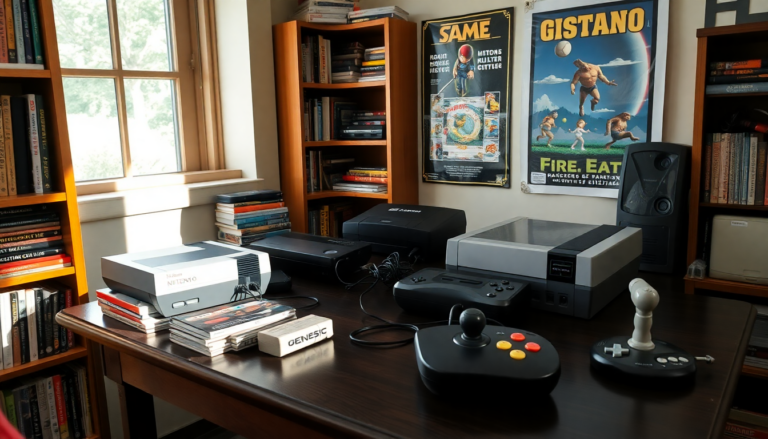Argomenti trattati
In recent years, the world of video games has witnessed a remarkable transformation. Once relegated to garage sales and hard rubbish, second-hand consoles and games have evolved into highly sought-after collectibles. This surge in interest has not only highlighted their nostalgic value but also their potential as investment items. For many, this trend is about more than just nostalgia; it’s a chance to connect with the past and preserve gaming history.
The collector’s paradise
Take for instance the story of Mick Burrows, a passionate gamer from Melbourne who has amassed one of the largest private retro gaming collections in Australia. His home resembles a video game museum, with shelves overflowing with consoles, games, toys, and memorabilia. Burrows’s collection reflects the evolution of gaming, showcasing everything from classic Atari consoles to Sega Dreamcasts, all displayed across multiple rooms. This setup offers a glimpse into the childhood dreams of many who grew up in the ’90s, where nostalgia is interwoven with modern gaming culture.
Burrows recalls a time when gaming consoles could be picked up for a mere fraction of their current value. “Back in the day, I would buy Game Boys for just a few dollars,” he reminisces. Such stories are common among collectors who once saw these items as outdated but now recognize their worth. This shift is indicative of a broader trend where collectors are not just preserving their memories but also investing in their hobbies.
The evolution of retro gaming culture
The journey of retro gaming has transitioned from a niche interest to a thriving global subculture, thanks in part to the internet. Online forums and social media platforms have created spaces for enthusiasts to connect, share, and trade. YouTube channels dedicated to retro gaming have fostered an appreciation for old titles and increased their visibility. The pandemic further fueled this interest, as many found themselves reminiscing about their childhood games while stuck at home, driving demand for these nostalgic items.
Moreover, the introduction of grading services by companies like Wata Games has added a new layer to collecting. Grading allows collectors to assess the condition of their games, which can significantly impact their value. High-grade copies of classic games have sold for staggering amounts; for instance, a copy of Super Mario Bros graded by Wata fetched an astonishing $2 million in 2021. Such sales have raised questions about market manipulation and the sustainability of this bubble, with some fearing it could burst as prices fluctuate.
Challenges and opportunities in retro gaming
Despite the challenges, the retro gaming market continues to thrive. Collectors like Kon Milonakos, who runs a retro game store in Melbourne, are witnessing a resurgence in interest for consoles from the late ’90s and early 2000s. Systems like the Nintendo 64 and PlayStation 2 are especially popular, appealing to a generation now with disposable income. Milonakos emphasizes that nostalgia plays a significant role in driving this market, as former gamers seek to relive their childhood experiences.
However, the landscape is changing. With the rise of digital gaming, physical copies are becoming rarer. Many publishers are moving towards online-only models, where players purchase access to games rather than owning physical copies. This shift poses a threat to the preservation of gaming history. The Video Game History Foundation has raised alarms about the implications of this trend, highlighting the necessity for tangible ownership in a digital world.
Collecting beyond the games
For many collectors, it’s not just about the games themselves; it’s about the entire experience. Scarlett Noorman, a lecturer in games and immersive media, explains how the physicality of owning a game brings back memories and feelings associated with childhood. Holding a cartridge, looking at the artwork, and the act of inserting it into a console creates a connection that digital versions simply can’t replicate.
This sentiment resonates with many collectors, who often embark on treasure hunts to find rare titles. The thrill of discovering a game at a garage sale or a thrift shop is a unique aspect of the collecting experience. As Sam Crowther illustrates, the joy of finding obscure titles or sealed editions fuels the passion for collecting. Each find tells a story, and for many, it’s less about the monetary value and more about the journey.
The future of retro gaming
As we look ahead, the future of retro gaming remains uncertain. While the current market is vibrant, challenges such as digitalization and changing consumer preferences loom on the horizon. Yet, the essence of gaming—nostalgia—will always draw people back. Collectors will continue to seek out the games of their youth, and as new generations discover the magic of retro gaming, the cycle will likely continue.
In a world that increasingly embraces digital experiences, the tangible nature of retro games serves as a reminder of the joy and simplicity of past gaming eras. Whether through collecting, refurbishing, or simply enjoying these classic games, the spirit of retro gaming is alive and well, offering a unique blend of nostalgia, community, and history.

